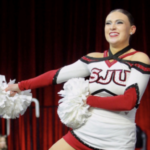Studies have shown that college athletes, especially women, are at higher risk for developing unhealthy relationships with food.
According to the National Eating Disorders Association (NEDA) website, “the pressure to win and an emphasis on body weight and shape can create a toxic combination.” Athletes whose sports focus on weight, appearance and muscularity, such as dance and rowing, are statistically more susceptible to disordered eating.
Elizabet Altunkara, director of Support Services at NEDA, said athletes are so susceptible to disordered eating because of the emphasis in sports on thinness, appearance and performance.
“This appearance idea that people are trying to achieve could really make those people who are already at risk for an eating disorder really get into a full blown eating disorder,” Altunkara said.
Anastasia Korbal ’22, a member of the St. Joe’s dance team, said being aware of what her body needs is an important part of her performance.
“You do have to be mindful of how you’re feeding your body and how you’re supporting your body,” Korbal said.
Korbal said strict practices regarding food are enforced in other collegiate dance teams, but she is grateful her coaches do not monitor the team’s food intake.
“There are other programs out there where you have to food log and we do not do that,” Korbal said. “I do appreciate that our coaches trust us on our own.”
Educating coaches about eating disorders is crucial to the success and health of athletes. Altunkara said coaches can contribute to becoming either a risk factor in developing an eating disorder, or a protective factor.
“It’s crucial for coaches to learn more about eating disorders and about the signs of eating disorders, because they’re at a position where they can identify the warning signs and hopefully get that student athlete the help that they need,” Altunkara said.
Ksenia Power, Ph.D., assistant professor at Temple University in the Department of Kinesiology, said that when approaching athletes who are dealing with an eating disorder coaches should be genuine and encouraging.
“When they pull athletes aside, they should not be approaching the issue in a judgmental manner because the athlete is more likely to shut down and not seek any further assistance or professional assistance,” Power said.
Sara Garstka ’22, a former member of the St. Joe’s women’s rowing team, said her coaches did not discuss weight. Instead, coaches opted to offer “soft suggestions.”
“Our coaches really didn’t talk about weight and nutrition at all,” Garstka said. “Even though it was a big part of our lives, it wasn’t addressed formally, I think because of concerns about it being perceived negatively or the negative impact it could have.”
Rowers are not required to maintain a specific weight, but even without weigh-ins for rowers, team members can struggle by putting pressure on themselves to maintain a certain weight, Garstka said.
“In the sport of rowing, weight matters because you’re in a boat,” Garstka said.“Your contribution to your team is dependent on your own body weight in addition to the weight of the boat. So, you can’t leave weight out. Even though we didn’t talk about it at team meetings, you can feel the culture of just needing to be fit, look fit and just have a healthy body composition.”
Strict diets, among other restricted forms of eating, don’t need to be recommended to be abused. Garskta said she is “anti-diet” but she still saw teammates struggling.
“Others are more extreme about it,” Garskta said. “Some on the team count calories, others don’t. I don’t think it’s healthy to restrict yourself, especially when you’re exerting your body at the level that we are.”
One way SJU Athletics is working to increase awareness about disordered eating among student-athletes is to encourage them to set up meetings with the department’s dietician and sports psychologist.
Steffani Holmes, the department’s registered sports dietitian, said she meets with about four to five athletes per week and gives presentations geared toward specific teams. These “team talks,” as she calls them, provide general guidance on eating, with reminders that calories are important to give a body energy and strength.
“Dietary recommendations differ from sport to sport and this is based off of the specific training styles that come with each sport,” Holmes wrote in response to written questions from The Hawk. “The three main components, power, strength and endurance, are utilized differently, and these factors alter the fuel sources our bodies use. Therefore, dietary recommendations differ.”
Alongside “team talks,” Holmes also runs a social media account, @sjuhawks_sportsnutrition, where she offers tips to athletes on safe ways to fuel up. In a Feb. 23 post, connected to National Eating Disorders Awareness Week, Holmes shared tips for practicing body positivity. The tips on Instagram included, “avoid the scale, eat when hungry, and self appreciation for what your body can do.”
This support network is important for athletes like Korbal.
“When we get to practicing as much as we do, our bodies are starting to really feel it,” Korbal said. “Your teammates are there to lift you up and to help you.”






































